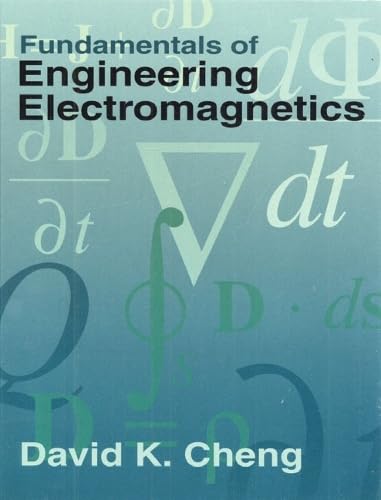Servicios al cliente
Sobre nosotros
Copyright © 2025 Desertcart Holdings Limited
Desert Online General Trading LLC
Dubai, United Arab Emirates



Fundamentals of Engineering Electromagnetics
I**A
A+
Utilizado para un curso universitario y fue de mucha utilidad.
C**N
Quality for the age is really good
No complaints. Was only 10 bucks and the book was I above average condition.
W**R
Recommended for Undergraduate
Excellent Book. It has many excercises,explained with very clearly.This book is intended for a second course in the University. For example, first course is using the resnick book and the second course is using this.
A**S
Three Stars
I though it was a hardcover, other than that it got home fast!
S**
Terrible condition, book full of writing and missing pages
had to throw this garbage away, book in very bad shape
K**.
good condition. great price!
I was looking for this new one, but it's so hard. but this condition looks like the new one. thank you !
A**.
Cheng's language makes the subject more difficult to understand
The subject is difficult, but the author's language makes it even worse. The book makes assumptions without telling the reader and very complex mathematical calculations are not worked out.A couple of weeks into the course, I found other textbook that were much clearer than Cheng's.
R**V
Unique development, but lacking in a few key areas
Cheng's logical development of electromagnetics is indeed novel, but the only real way to appreciate it is to first have had a decently rigorous course on electromagnetism or have read another electromagnetics book. The reason why I say this is because at the onset of the book, Cheng puts forth his electromagnetic model, but there is absolutely almost no motivation for this model. It seems completely arbitrary, although it does yield familiar results. No basis for the model based on experiment is provided; therefore, I suggest that one first read a book that takes one through the historical path of development -- leading from experiment to generalization. Also, I have found a major error in the theory of the book. In Chapter 6 when Cheng is talking about potential functions, he correctly derives a formula for the curl of a potential function. Now, the basis of the book is that one can develop electromagnetics in an orderly fashion by specifying both the divergence and the curl of a vector. So, in order to fully develop the potential vector field, he says "we are still at liberty to choose the divergence of A." He then states a formula known as the Lorentz condition for potentials and motivates it simply because it simplifies another equation. However, this is logically incorrect. Just because one knows the curl of a vector field does not mean one is at liberty to state its divergence. Again, Cheng is completely arbitrary here and provides no basis for why he does this other than the fact that it simplifies an equation. Many other books correctly deal with this matter -- even on the introductory level. What really happens is that the Lorentz condition is a result of the relation between electromagnetics and the theory of relativity; when electromagnetic theory and relativity are combined, the Lorentz condition follows logically. Sadiku's Elements of Electromagnetics correctly states this, as do other texts. The reason why this is so important is that this is the crucial link between showing that electromagnetic fields that vary through time are represented as waves! This violates the nature of the book -- that it should be logically consistent, orderly, and non-abrubt in its reasoning. Finally, I would like to say that Cheng's book Field and Wave Electromagnetics has the same downfall. However, I believe every serious student, engineer, and even scientist should read through Cheng's Field and Wave Electromagnetics because it is more rigorous. What Cheng has done is really interesting, but I simply cannot recommend this for any first time student. And, do not buy this book; buy his Field and Wave Electromagnetics because it is superior. Last and final note: the development of transformers is much inferior to most books (including his own Field and Wave Eletromagnetics). Check out my review on his other text.
Trustpilot
Hace 3 días
Hace 1 mes